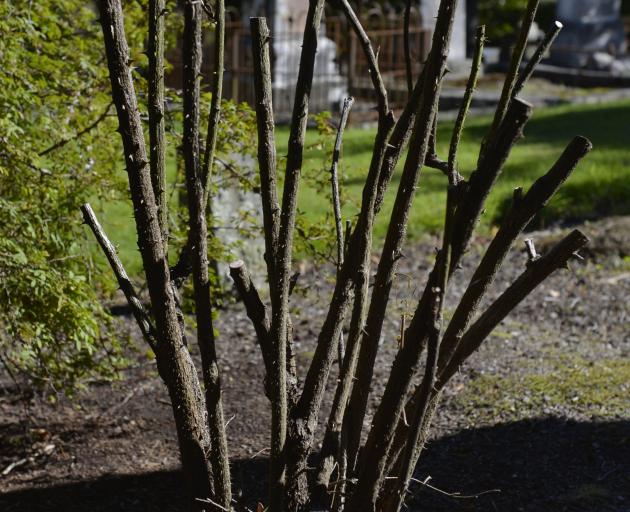
The Dunedin City Council says tests of the poison showed it was not that used by contractor Delta, and the recent poisoning happened after Delta stopped its weed work at the cemetery.
But Heritage Roses Otago convener Fran Rawling has questioned how the council could conclude it was not Delta.
Late last year it emerged roses at the Northern Cemetery had been sprayed with some type of herbicide.
About 500 roses, more than 40% of about 1200 at the cemetery, showed signs of damage, including some memorial roses planted by families of those buried at the cemetery in the 1800s.
The council conducted soil and foliage tests to discover what had caused the damage, and the results were released last week.
Acting group parks and recreation manager Tom Dyer said the test results, and other evidence, meant the results of the investigation were ``inconclusive''.
He said it was not, however, likely to be the contractor.
``A number of other things point away from contractor error, including the nature of spray damage, the location of spraying and the contractor's long-time experience managing the cemetery.''
Delta had not done any spraying at the cemetery since the damaged roses were discovered.
More damage had occurred recently, and the areas affected and pattern of that damage indicated someone ``may have caused damage unintentionally when spraying a loved one's grave''.
Mr Dyer agreed it was unlikely last year's damage was done in such a way, as it was widespread, and affected roses across the cemetery.

Heritage Roses Otago and Delta had told the council about the recent spray damage which had occurred some time over the past couple of weeks.
That herbicide damage to rose plants had ``clearly'' been done by someone with a sprayer in the cemetery who had walked along with spray dripping from a nozzle.
``Again that's not what I'd expect from our contractor; all their gear is well maintained, and we don't see that on other sites.''
Mr Dyer said it was possible last year's incident and the recent incident were not linked.
He was confident last year's incident was not the result of a poorly performing Delta employee.
The chemical involved in last year's spraying was Picloram, used in brush killer products like Tordon and Metsulfuron, and ``those particular products aren't in use by the contractor on that site.''
Mr Dyer said the council was doing everything it could to find who was responsible and make sure the problem was not repeated, but it still had ``a way to go''.
A growing trial of peas in affected soil was under way to ensure any new rose plantings would not be affected.
Mrs Rawling said the fact the report was inconclusive stood out for her and she was not sure how the council came to the conclusion Delta was not at fault.
``I would certainly query where that came from; how did they come to that conclusion it's not likely to be a contractor?''
The contractor was responsible for the spraying, and she wanted to hear from them.
Delta's contract said employees were not to spray near roses, and had to weed by hand, but ``there is a lot of evidence of a nozzle going under a rose and round a trunk, and we've got photographic evidence of that, and so have they.''
Mrs Rawling said some of the roses had made a comeback, but there were ``a lot'' that had not, some having died.












